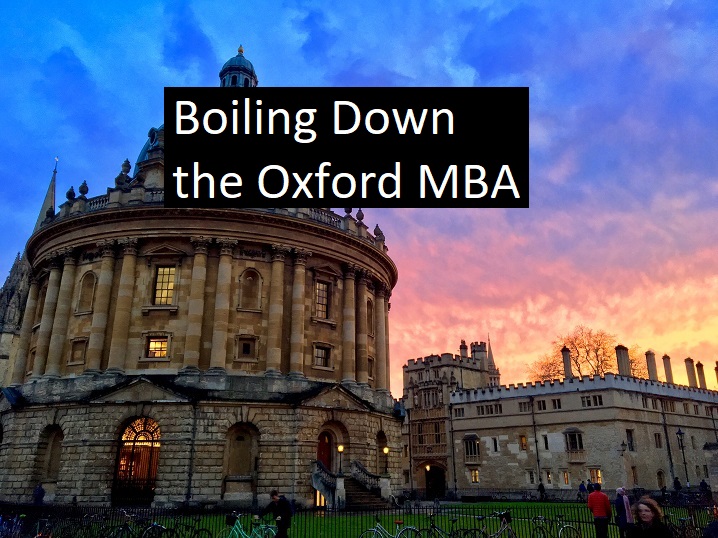Boiling down the Oxford MBA

Follow my journey, as well as my 2018-19 MBA classmates’ experiences during their time on the Oxford MBA programme, at http://mba.sbsblogs.co.uk/
Writing in Paris on a sunny summer day, I’m coming to terms with the end of the Oxford MBA degree. There are few triumphs like setting a stretch goal over years and striving above setbacks to achieve it. The Oxford MBA has been nothing short of a profound, intense and demanding year filled with growth, development, and learning with the typical associated twists and turns. There have been numerous teachings, humbling moments, mental models, theories, successes & failures, and connections that I will take from my time in the dreamy city of spires that is Oxford.
For my final entry as a student blogger, I attempt to distill some of the more pragmatic lessons and advice that I’ve either received or unearthed in the degree. These are by no means all-inclusive but hopefully offer a helpful menu of items applicable in divergent scenarios.
Even though grades are important, an MBA is ultimately experiential
A friend of mine told me, “in Oxford anything above a passing grade can be considered a distinction elsewhere.” While I don’t entirely subscribe to this mode of thinking, many of the most formative memories will have been outside of the business school in dining halls, colleges, and extracurricular pastimes. The famous essay crises of Oxford do train students to produce high quality outputs in limited time-spans, and I’ve spent numerous all-nighters in the college library doing just that. While the classroom is one (considerable) forum for exchanges, it’s only one dimension amongst many. A well-rounded experience can only be filled in by the richness of content outside of lectures.
Establish a first impression and reputation, it sticks
Just as in the office, it’s hard to shake off how we are perceived from day one. It’s worth creating a strong first look and to reinforce it with repeated actions over time. Perception is reality. And your reputation is what is expressed behind closed doors when one isn’t in the room. This begs the question: how do you want to be remembered?
Hack the learning curve: study in groups
It’s all about the people, whether in an MBA course or in the office. The peers are the most precious asset in a class, and this was made apparent to me on several occasions while studying for exams as varied as accounting, business finance, marketing, or firms and markets. There are gaps in each person’s understanding, and the holes can be plugged by shared contributions. As Robert Heinlein said, “When one teaches, two learn.” I owe a debt of gratitude to many classmates who saved me countless hours of individual study.
Don’t wait, just do it. Be proactive with a bias for action
“If you don’t design your own life plan, chances are you’ll fall into someone else’s plan. And guess what they have planned for you? Not much.” – Jim Rohn
We are our own life architects and agents of change who can shape outcomes with the right ownership matched to urgency. A key takeaway from the degree has been that everything is negotiable and that there really is no standard playbook to achieving results. It’s up to us to define our objectives and set forth a path towards realising them. As an example, as there was no pre-existing Government & Policy Club in the business school, a classmate and I co-founded one and ran with it to organise a successful term card of annual events.
Ideas are easy, execution is hard. In the MBA we at times get caught up in strategizing and brainstorming. There are infinite possibilities that can be debated yet fail to move the project forward. Half the battle is getting words on paper and I would argue that value resides in the doing more than the talking.
Mistakes are inevitable, but invaluable and necessary
I don’t want to harp on the virtues of “fail fast and break things” but there is validity in testing things out and learning from them, as done with the scientific method of hypothesis, experimentation, and analysis. I’m an enthusiastic proponent of trial and error, whether it’s in choosing a career, class electives, or relationships. We are predisposed to imagining how something will or should be without experiencing it. Reality is the only way to really know based on data points borne out from tangible exposure. We’re bound to make missteps along the way, yet it’s only by moving forward that we can make progress.
Seek out and provide feedback, It’ll make you and others better
We all have blind spots and areas for improvement. But we can’t begin to address these if we aren’t aware of them in the first place. Raising issues amongst ourselves is by no means an easy task, although it is a genuinely constructive endeavour that allows us to either make strides in or at least become mindful of weaknesses that we can then mitigate. Emotional intelligence becomes more vital as one moves up the hierarchy into management, and the MBA provides an environment to enhance not only business acumen, but also self-awareness, professional behaviour, and leadership.
If you never ask, you will never receive
This was a gem of wisdom that was handed down to me by a CEO within a former employer. We may expect that others know what we want, but it is only through explicitly stating our wishes that others may comprehend what it is that we are pursuing. Struggle as I may with direct, specific requests, they are highly effective in surfacing and servicing a need. Moreover, it’s essential to pay forward such favours to others.
The 5-Minute Favour Rule: Go out of your way to help without the expectation of return. It’ll pay for itself in dividends
I’m fond of the principle of a “5 minute favour” wherein anyone can be deserving of several minutes of your time. Advice or eventual introductions can veritably and positively alter the tangent of someone’s future path, which is terrifically rewarding to facilitate. As is often said, what goes around comes around. Karma favors the generous, compassionate, and kind. Being known as a “giver” may run counter to the mainstream depiction of a business school, yet it’s by instilling a norm of cooperation that the magic of teamwork can really take effect to unlock virtuous cycles where everyone can benefit. No person is on an island, we are all interconnected and interdependent.
Balance urgency against importance
The Eisenhower matrix underscores the dimensions of urgency vs. significance. In MBA programs – particularly in 1-year formats – the pace of information is like “drinking out of a firehose.” As students we are overwhelmed by the breadth and volume of content, so we tend to revert to survival mode of fighting fires as they appear in front of us. But I would argue that we also need to zoom out and take stock of the big picture (“field”) so as to not lose ourselves in the details (“weeds”). There will always be short-term tasks to attend to, but it’s the long-term direction – ambiguous and murky as it may be – that drives impact and real transformation.
Think in terms of scarcity
The scarce nature of a good makes it all the more valuable in other settings. This notion of an “unique advantage” is where one can excel extraordinarily with minimal effort. Likewise in Oxford, I sought to tap into resources and spend energy and time on situations that are unavailable elsewhere. For me it was travelling to meet extraordinary people, attending cross-departmental lectures, organising socials & knowledge sharing events, and generally soaking in the scarcity that Oxford exceptionally offers in spades. Do more of what you can’t do somewhere else.
Prioritise and plan, while also seizing the moment
Oxford students have the privileged problem of being forced to choose between one of three exceedingly appealing options at any given time during the academic terms of Michaelmas, Hilary, and Trinity. To confront such information overload (the “firehose”), I took it upon myself to organise a shared Google calendar for the entire class to incorporate university-wide events. The micro-decisions each student undertakes are based on individual priorities. In my case, I could be seen multi-tasking, running from point A to point B with a laptop in my hand while on the phone. I even had two meetings scheduled in parallel inadvertently. In hindsight, I forgot that we sometimes should let go of pre-conceived schedules and live in the present. Oxford’s small size lends itself to forming a tight-knit community where serendipity can flourish, from chance encounters on the street to evenings out in the pub. It’s during those most unexpected occurrences that the greatest utility can be derived.
Create spaces to absorb thoughts and re-centre
We live in an era of pride in the “hustle” and working into excess for ambitious professionals at the risk of stress, dissatisfaction, and burn-out. While I actively encourage perseverance and a strong work ethic, we also require space for recovery, reflection, and re-calibration to digest and internalise our newfound capabilities. I have to remind myself that life is a pursuit of a marathon, not a sprint.
Befriend people who don’t look like you
It is all too easy to fall into a comfort zone and to discuss ordinary topics in a native language, especially when English isn’t one’s mother tongue. And that’s normal, we all need breaks.
But the only real way to challenge assumptions is by actually (respectfully) disagreeing and reevaluating those beliefs held dear as part of a worldview. If we want different results, then we have to make different choices. And that starts with whom we surround ourselves. The Oxford MBA features more than 60 nationalities, an incredibly unique community that offers a richness in diversity that’s seldom found elsewhere. The most significant learnings are found in the interactions and exchanges amongst students of the cohort. Moving out of one’s comfort zone to engage with such a heterogeneous group enables perspectives that refine existing views or open new horizons and possibilities.
“Networking” doesn’t just mean exchanging business cards
“Networking” is an often-cited empty platitude in my view. Business school students are guilty of approaching professionals with the express aim of landing a job. Nevertheless, this direct angle of attack is frequently short-sighted. People can and do sense a transactional connection. Networking in its truest definition is building a genuine relationship on a long-term basis for both parties. An MBA is certainly a door opener, though it doesn’t negate needing to know your stuff – such as the firm, industry, trends, competitors, etc. – and why you’re a good fit for a role. You can’t replace preparation, subject matter expertise, the authentic interest in a profession, a compelling narrative, transferable skills or experiences, and emotional intelligence to make complex decisions with an MBA degree.
The value of the MBA degree starts after graduation
Deadlines come and go, relationships last. A useful framing is to ask oneself until when a certain subject will matter against a timescale to tease out the underlying significance of activities. Will this be relevant after one minute, one hour, one day, one week, one month, one year, one decade, one lifetime? Often, a deadline indicates the termination of the assignment that no longer matters, or if anything beyond a few weeks to a month. Classwork is undoubtedly important, but the quality and depth of relationships matter even more over the course of one’s lifetime.
After studying in seven universities, while I may be able to recall the net present value or a framework to solve a certain problem, it is the mental capacity to begin with first principles and build up a tree of knowledge from the ground up that counts in multiple contexts. Beyond that, it is the friendship of peers that I carry to this day. Relationships tend to blossom after months, years, and decades. So invest into relationships wisely and go confidently in the direction of your aspirations.



